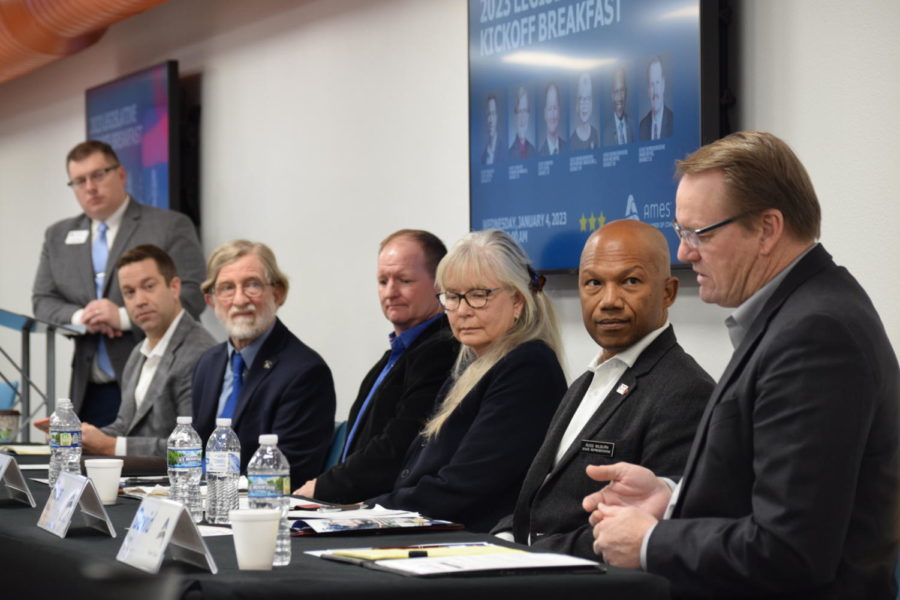Property taxes ‘should be vested with local entities’: Ames mayor tells legislators
State Sen. Jesse Green, Sen. Herman Quirmbach, Sen. Jeff Elder, Rep. Beth Wessel-Kroeschell, Rep. Ross Wilburn and Rep. David Deyoe at the Ames Chamber of Commerce Legislative Kick-Off Breakfast on Wednesday. (Left to right)
January 4, 2023
Elected officials representing Ames and Boone differed on whether property taxes need to be reduced in the upcoming legislative session during the 2023 Ames Chamber of Commerce Legislative Kick-Off Breakfast.
On Wednesday, Republicans said constituents are concerned about potential tax increases, while Democrats said local services need to be taken into consideration before reductions are made by the state.
City of Ames Mayor John Haila asked the panel to encourage their constituents to address issues relating to property taxes at the local level. Property taxes are billed and collected by the county government, according to the Iowa Department of Revenue.
“They [constituents] are jumping over those who are actually sending it, and they’re asking the state to come control us on the local level,” Haila said.
The Story County Supervisors have cut property tax rates for the last two years. State Rep. for District 51 David Deyoe said he believes the assessment increase is driving constituents fear that property taxes could increase.
Deyoe said there are restrictions on property taxes to prevent high increases in a single year, but they still could catch up over a period of time.
For some communities, K-12 school funding is nearly half of their property taxes. Deyoe said the state could backfill the current formula to provide tax relief.
“We have done a lot of stuff on property tax over the years,” Deyoe said. “It tends to just be to limit the increases. It is hard for people to understand what we have been doing, but I think we are going to continue working on it, hopefully, to come up with something that works for everyone.”
In 2013, the state passed a property tax reduction bill. The state promised to backfill the funds to make up for revenue losses at the local level. In 2017, the Des Moines Register reported that the funds the state paid back did not equate to the reduction in property tax revenue for local governments.
“I don’t trust the state to keep promises as far as property tax reform is concerned,” said State Sen. of District 25 Herman Quirmbach. “If you want to cut property taxes, let your local officials do that. If you don’t want the services and prefer lower taxes, communicate that to your local official. If they don’t respond appropriately, vote them out of office.”
Cutting property taxes results in cutting services, Quirmbach said. This includes police and fire departments, libraries and recreation, all services that attract residents and tourists, Quirmbach said.
State Sen. of District 24 Jesse Green said property taxes are a focus of this legislative session because Iowa ranks 40th in the nation, and constituents have expressed concerns.
“They see that we have taken the mental health levy off the property taxes, but then half the counties in the state haven’t seen those savings,” Green said.
Incumbent members of the Ames City Council and Story County Board of Supervisors were all reelected in the last election cycles. Quirmbach said this shows the state should not mess with the work local government accomplishes with property taxes.
State Sen. for District 26 Jeff Elder also received calls regarding property tax rates.
“I think it is probably time we take a look at the formula to see if it still works in this economy and environment,” Elder said. “I am open to discussion on it right now.”
According to reporting from Iowa Public Radio, Senate Majority leader Jack Whitver could not confirm the Senate would look at a tax freeze, but he also said he would not “rule out the option.”
Haila asked the elected officials what services local government should cut to make up for the reduction in municipal revenue. While the tax freeze is speculation as of now, Halia said it would require the council to go back and review labor and union contracts.

“We have contracts that are locked in, and we need to honor those,” Haila told the Daily after the event. “So if we can’t increase revenue, how do we pay for those?”
State Rep. for District 49 Beth Wessel-Kroeschell said Ames residents put a high value on public services such as public safety, which currently makes up nearly 50% of the city’s budget.
“I think we have to be very careful,” Wessel-Kroschell said. “So when we are talking about transparency and accountability, let’s make sure we’re talking to the people about what their values are…So much of what local governments offer are highly valued by Iowans.”
State Rep. of District 50 Ross Wilburn said there are limited ways for cities, counties and schools to generate funds.
“Not every town has a local option sales tax. Not every town has access or permission to have gambling,” Wilburn said. “So that is what we as legislators need to think about as opposed to just lumping all of our local government into one particular entity…What services are we going to want local government to not be able to provide?”
Halia told the Daily more information regarding property tax rates would be known in the coming weeks, which he will bring before the Ames City Council.
“You are taking on something that really should be vested with the local entities,” Haila said. “Work with us or talk to us because we are willing to talk and want dialogue.”

















